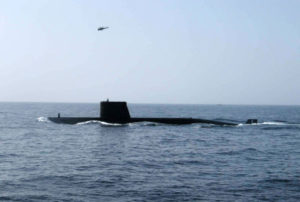The Indian Ocean is among the world’s largest oceans. It comprises nearly one‐fifth of the entire oceans of the world. In the west of Indian Ocean there lies Africa and Arabian Peninsula while the central Indian Ocean touches its boundaries with India’s coastal waters while on its west there stands huge range of Himalayan Mountains. The ocean connects the Middle East, Africa, and South Asia within the broader Asian continent to the east and Europe to the west. Pakistan is also one of the littoral states of the Indian Ocean. Pakistan also claims its share in the Indian Ocean. The economic opportunities and resources compel Pakistan to secure its economic interests in the Indian Ocean. Moreover, the limited lines of land communication in the eastern hemisphere have resultantly increased the importance of the areas attached to the ocean. Trade and commerce are the most critical variables, particularly to the strategic choke points where the Indian Ocean is contiguous to other large bodies of water. Among the important choke points of the Indian Ocean Region (IOR), the Strait of Hormuz and the Mallaca are most the important for some Asian countries, especially for the South Asian region.
Pakistan shares a 990km long coastline located at the heart of the Arabian Sea and is among the major littoral states of Indian Ocean region (IOR) as mentioned above. It has a bulk of marine economic resources in its Exclusive Economic Zone (EEZ). Its Western coast adjacent to the Gulf makes it strategically substantial by providing shortest sea route to the landlocked Central Asian Republics (CAR’s), Afghanistan and Western province of China. Due to China’s One Belt One Road (OBOR) initiative and China-Pakistan Economic Corridor (CPEC), the Indian Ocean assumes even greater significance for Pakistan.
Subsequently, to secure its economic interests in the Indian Ocean, recently Pakistan has conducted a successful test of an indigenously-developed submarine-launched cruise missile (SLCM) ‘Babur’ having a range of 450km on March 29th, 2018. However, the international media has negatively portrayed this action by Pakistan as a step towards nuclearization. A report by Vox news on April 4th, 2018 says that “The acquirement of nuclear-armed submarines by Pakistan and India has increased the chances of a destructive war between the two countries.”
However such criticism holds no weight because actually, that fact is that Pakistan’s test of SLCM is nothing but to secure its economic interests in IOR. It is important for Pakistan to maintain the deterrence so that it could secure the options for foreign trade and investments. Securing its economic interests in the IOR is important for Pakistan because almost 97 % of Pakistan’s trade is carried out through the port of Karachi, Muhammad Bin Qasim, Gawadar, Pasni, Jiwani, Gadani, and Ormara. Long stretched coastline, and significant harbors provide Pakistan with a location that is ideal for sea-borne trade and commercial activities carried out mostly in foreign ships. Pakistan‘s role in international navigation, the EEZ and Gwadar port are highly significant for the country‘s economic development.
In the current power dynamic, China’s OBOR initiative and CPEC give momentum to the Indian naval forces to harm Pakistan’s interests. CPEC and Gwadar port has the potential to make Pakistan into an economic hub of trade and development which is apparently not acceptable to India. Therefore this situation has also catalyzed India’s objective to damage Pakistan’s economic vision, acquiring the nuclear triad will provide Pakistan a second strike capability, and it will reduce the threat of total loss and mutually assured destruction. Pakistan has always been following a defensive strategy, and Babur-SLCM is one such effort to essentially stabilize the economy by acquiring defense modernization to deal with economic threats. Moreover, it will prove a more secure and safe environment for the foreign investors because Gwadar is a bridge between east and west. The economic progress of Pakistan through Gwadar and CPEC provides an opportunity to substantially increase the trade between eastern, west Asian, African, Middle Eastern and European countries with Pakistan. Therefore it has become important for Pakistan to protect the sea lanes of communication. Pakistan Defence will best serve to protect Pakistan’s Economic Interests in the Indian Ocean and deter India against taking any strict actions against Pakistan.

